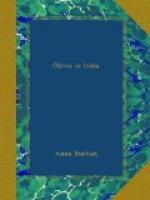At the station we were told that the train was two hours late, and Boggley thought it would be an excellent plan to spend the time calling on the Blackies, who live near; so, leaving Autolycus and the chuprassis with the luggage, we set out. We had been shown the flower-garden and a crocodile that Mr. Blackie had shot, and were about to drink a dish of tea in the drawing-room, when we heard the whistle of an engine. “The train!” cried Boggley, bounding to his feet, and spurning the cup of tea Mrs. Blackie was offering to him. It was no moment for ceremony. With a shrieked good-bye we leapt out of the window and across the compound, and set off on our half-mile run to the station. There is something peculiarly nasty about the nature of Indian trains. Simply because we left the station it chose to be up to time. It must have been an amusing incident to the people in the station, but I would have enjoyed it more had I been one of the natives watching from a third-class carriage instead of, so to speak, one of the principal actors. There was the engine shrieking in its anxiety to start; there was our luggage neatly spread all over an empty compartment; there was Autolycus protesting shrilly that the train could not leave without his sahib, who was a very burra sahib; and finally there we were with scarlet faces, topis on the backs of our heads, surrounded by a thick cloud of dust, careering wildly into the station.
After all the fuss, we had only about thirty miles to travel, when we got out and drove three miles in a kind of native cart to a dak-bungalow, a very poor and uncomfortable specimen of its kind. It didn’t uplift us to hear that plague was very bad all round, and after a somewhat jungly dinner during which we were very thoughtful and disinclined for conversation, we sought our mildewed couches, to rise again at skreich of day and continue our journey, till late on Tuesday night we got out finally at Baratah station and drove out to our present camping-ground. The people knew we were coming, and the tents were up; but they hadn’t expected us till the next day, so nothing was ready, not even a lamp. It was the oddest experience to stumble about in black darkness in entirely unknown surroundings. You know how Boggley tumbles over things in the broad light of day, so you can imagine what tosses he took over dressing-tables and chairs in the darkness. It didn’t last long, however, for an important fat khansamah hurried in, shocked at our plight, and, explaining that his sahib, Mr. Lister, was away for a few days, brought us a lamp and other necessaries. Dinner was not possible under the circumstances—the box with our forks and knives had not arrived—so the remains of Mrs. Royle’s luncheon-basket coldly furnished forth our evening meal While we sat there, uncomfortably poised on dressing-bags, gnawing legs of fowl and hunches of bread, I thought of you probably dining at the Ritz or the Savoy, with soft lights and music, and lovely food, and probably not half as merry as Boggley and I.




